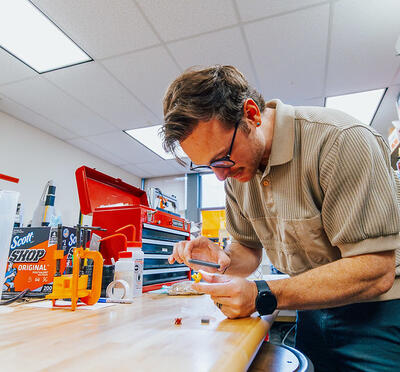While working as a senior mechanical design engineer for a large tech company, Samantha Kang, a doctoral candidate in mechanical engineering, bristled at the thought of migrant workers on the manufacturing floor being paid less than $4 an hour, to make a product that sells for hundreds. This social inequity motivated Kang to leave the industry.
“This was a formative experience for me,” Kang said. “It drove me back to school.” Joining Oregon State University in 2020, Kang sought to reexamine the concept of “improvement” in technology within the context of cultural and social norms. In doing so, Kang embarked on a “radical reimagining of engineering design.”
Kang, who uses they/them pronouns, began work with their advisor Andy Dong, professor of mechanical engineering and school head.
“Applying a feminist critique to longstanding theories of technology evolution began when my advisor handed me my first theory paper, called ‘Thinking About Technology: Applying a Cognitive Lens to Technical Change,’” Kang said. “At first, I didn’t understand the words on the page, so I spent the next six months digging into theories and concepts of technology innovation.”
Kang reached out to academics with similar interests, like Kacey Beddoes, the assistant dean for systemic equity and engagement at Washington State University. They also studied technofeminist literature and completed a social justice theory course offered through the Women, Gender, and Sexuality Studies program at Oregon State.
In June 2022, Kang’s academic trajectory took an unexpected turn.
While rock climbing Unicorn Peak in Mount Rainier National Park, Kang suffered a near-fatal fall, incurring lifelong injuries and a long road to recovery. Their research and coursework were halted for over six months. Through misfortune, Kang found insight.
“My experience as a severe trauma patient also impacted my views on gendered technology,” Kang said. “The accident gave me time and brought clarity to what I wanted to focus my research on.”
This clarity led to the paper, “Gender-Based Social Revolutions and Their Effect on Technology Evolution: A Case Study of the Sewing Machine,” co-authored with Dong.

At the 2023 American Society of Mechanical Engineers conference, held last August in Boston, Kang and Dong’s publication won Best Paper in Design Theory and Methodology.
“I was shocked by winning best paper. It was like being struck by lightning,” Kang said. “I’m glad it spoke to people.”
The paper adds to a growing discourse regarding the relationship between power and design through questions such as: “Who do we design for and with, who gets to design, and what values do we encode and reproduce in the technologies we design?”
Through a feminist critique of technology and a new model that integrates social norms, such as the expectations surrounding gender, into traditional technology models, Kang and Dong argue that social revolutions “are as important as scientific advances in fomenting significant technical change.” They used the example of the sewing machine to elucidate this thesis.
“Looking at how products are developed, the sewing machine — a highly gendered product — did not come out of thin air,” Kang said. “So, that’s what led me down the path to looking at sewing machine patents.”
In much the same way Kang found a need to integrate social justice into design theory, they saw a need for affinity spaces in Corvallis for Black, Indigenous, and people of color communities. Such spaces are dedicated to fostering the success of individuals through equity, diversity, and inclusion. Kang first encountered one through Portland Climbers of Color in 2018; the experience was impactful.
“There was a moment in the night where I could relax my shoulders and speak without filtering,” Kang said. “I thought, ‘I can talk about my identity — my East Asian identity and what it means to be Asian American — and all the other things I might hide or not address.’” New to Corvallis in spring of 2020, amid pandemic isolation and civil unrest, Kang founded Corvallis Climbers of Color after reaching out to Valley Rock Climbing Gym co-founder Johanna Garcia. Kang says climbing is a way to address vulnerability and fear.
“Bringing people to a space where they feel comfortable, like an affinity space, to connect with nature while overcoming these fears is meaningful,” they said. “Over time, individuals at CCOC blossom into thriving and vibrant people.”
CCOC hosts two climbs per month and climbing clinics at Smith Rock State Park. Last July, the organization showcased a film by Skylar Davis at the Whiteside Theatre, which featured Kang and other people of color as leaders in outdoor spaces. The organization also collaborates with Everybody Climbs, a multicultural climbing group.



